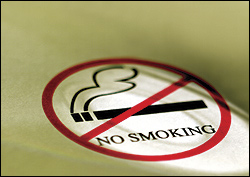When I was a kid, I fantasized about randomly shooting smokers. When my imaginary trial came up, I planned to tell the judge that I acted in self-defense—they were blowing smoke in my space, they were trying to kill me. Besides, they obviously wanted to die, or they wouldn’t be smoking. I was just helping the process along.
I have always despised tobacco smoke. I grew up in a smoking household, and from the time I was an infant I found the odor not just annoying but repellent. This was long before the science was in on secondhand smoke; it was just something I knew instinctively.
As an adult, I’m more tolerant, but I basically feel the same. I can’t imagine why anyone wants to indulge in, let alone sign life away to, this disgusting habit. Its petty pleasures, enhanced by marketing, are nowhere near worth the costs.
So I should be overjoyed with Initiative 901, the Nov. 8 ballot measure that would ban most indoor and some outdoor smoking. But I’m not. I’m voting no.
As obnoxious, as unhealthy, and as socially expensive as cigarette smoking is, it’s still a legal activity in this country—one that tens of millions of people engage in. This initiative goes much farther than most of the indoor smoking bans on the books around the country, barring not just indoor smoking in public buildings but smoking within 25 feet of a doorway.
That’s about as far as it’s politically possible to go in this country toward total prohibition. But as with any addictive substance, the problem is that prohibition doesn’t work. People are going to get their nicotine fix regardless. When are we going to learn? Addictive, toxic drugs are a public-health problem—not a legal one.
As for the dangers of secondhand smoke, this is not nuclear radiation, where any level of limited exposure, no matter how infinitely small, could be toxic. A ban on smoking in enclosed spaces that are shared with nonsmokers makes sense. (Though in the case of bars, it seems faintly ridiculous to ban smoking in businesses whose sole purpose is to enable the consumption of toxins.) But nobody is going to get lung cancer from catching a whiff of smoke while walking through a doorway.
Most smokers are aware that secondhand smoke can be obnoxious, and they make reasonable efforts to balance being polite about it with their need for a fix. We have too many laws on the books anyway without trying to legislate politeness. I-901 goes beyond the health of nonsmokers and isn’t needed to regulate civility. It would treat smokers like pariahs. Again, this is an addictive habit. Most people aren’t going to quit just because society thinks it’s a bad idea. Hell, that’s why more than a few people start smoking.
Besides, this is a law that is unnecessary. Most businesses and offices have already discovered, without any prodding from the state, that it’s good business to offer a smoke-free environment. It’s more pleasant, it saves on health and insurance costs, and customers usually appreciate it.
I’m just not seeing a regulatory need here. The doorway provision, in particular, strikes me as nearly unenforceable. Is somebody going to go around with a tape measure and a ticket book?
Rates of smoking are on a steady, long-term decline in this country, due primarily to increased awareness of the health effects. A half-century ago, the assumption was that most adult men smoked. A ban of this type would have been unthinkable, because too many people—legislators and voters included—were smokers.
What we’re talking about, then, is a legal standard being changed because smokers are fewer in number today. “If you smoke, you must do so away from us civilized people.” This is the very embodiment of a majority exercising legislative power over a minority. I’m reluctant to refer to smokers’ “rights,” as though the right to slow suicide is somehow enshrined in the Constitution. But somebody’s trying to use the law against somebody else here, and it isn’t pretty.
I find indoor smoke as loathsome and unhealthy as anyone. But I-901 goes too far. It’s an abusive, overreaching example of the nanny state.







